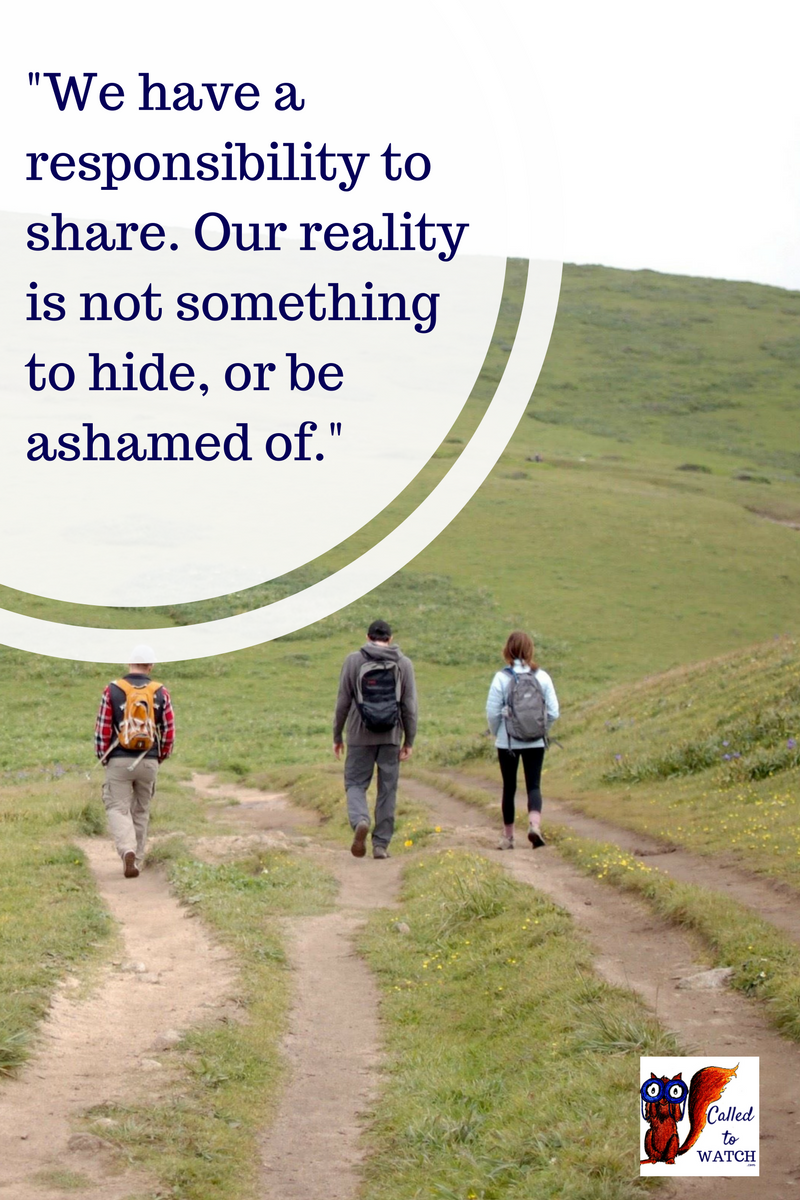Chronic illness is…well, chronic. For the most part, not only does it not end, but it remains the same.
Of course there are changes, developments, progressions – but these are generally subtle in nature and may vary between individuals.
Perhaps our Loved One is slowly but surely declining.
Or maybe their sickness fluctuates without rhyme or reason. Some days they are well, others they are not.
Or perhaps there is simply no visible change at all, just a long, monotonous pain.
This aspect of chronic illness is trying for everyone involved. This is especially true when it comes to communication.
It is a blessing when those around us remember to ask about our Loved Ones… but it is hard too. When there is nothing ‘new’ to report, and the truth is that ‘they are the same’ or ‘they’re not going to get any better’ we often don’t want to answer.
We flinch, and wish the question had not been asked.
Why is it so hard to answer the question “how are they?”
-
We don’t want to be the bearer of bad news.
When there is no improvement to talk about, no progression towards healing, answering the question ‘how is your Loved One?’ is very hard.
Sharing bad tidings is not enjoyable, and we often feel like we are disappointing the inquirer when we reply ‘the same’ or ‘worse’. When we are asked in a group it’s even more difficult – we don’t want to lower the ‘mood’ or sound depressing.
And so we hesitate.
What can we do?
Trust the inquirer and trust God.
It’s not our job to ‘curate’ news or formulate a nice experience for others.
Let us trust that they are actually interested in the truth and also that they are able to cope with it.
Of course there is room to be sensitive and choose our words with care, and we have a responsibility to do both. But we also have a responsibility to share.
Our reality is not something to be ashamed of, or one to hide, as if our Loved One’s suffering were a colossal shameful accident. We know this is not true. We need not be apologetic about the truth.
If we trust God with our Loved One’s sickness, let us also try and trust Him with the way it impacts other people’s lives when we share it.
And suppose we do depress our listener. Suppose our sad report does bring them to a crisis of understanding and faith. Is that so bad?
Cannot God use this too – to grow their character, their faith, their knowledge of the world and reality?
Every time we shy from difficult or uncomfortable situations, we limit God and patronize others.


-
We don’t always have the emotions to match our words.
Where do we get asked about our Loved Ones?
Surely it is at gatherings: parties, celebrations, graduations, catch-ups. All these are generally happy times.
No one asks us about our Loved One when we are at a funeral or visiting someone else in hospital.
No, they ask us when we’re drunk on friendship and excitement. Yet our response to their questions (‘they’re much the same’ ‘they’re never going to feel any better’) will at the very least be somewhat sobering, if not downright depressing.
How do we deliver a sad answer truthfully when we are otherwise feeling happy?
Are we to be expected to bounce from light-hearted to serious, from shallow to deep a dozen times a day, and at a party no less?
It’s exhausting, straining, and impossible.
What can we do?
Let us accept this.
Our emotions are not always going to match our words. The best we can do is answer what we can, how we can.
Some days when a friend asks us we will have to stop and try and remember how our Loved One is that day.
We will feel terrible and perhaps guilty that they weren’t foremost on our mind in that moment.
We will genuinely struggle to express sad realities in the midst of joyful celebration. Sometimes we will succeed and other times we will fail.
Life is like that. Let us be gracious to ourselves and others.
Above all else, let’s be honest, even if it means admitting, ‘They’re much the same. I don’t really have anything else to say,’ or ‘I’m sorry, I really can’t give a proper answer right now’ or ‘I’m finding it difficult to talk about that at the moment.’
-
We are placing the listener in an uncomfortable position.
Our explanations about our Loved Ones are not easy to respond to.
That is the nature of chronic illness. There is no perfect response, no answer.
When we utter blunt truths such as, ‘they’re really finding it hard’ we might ‘throw’ the inquirer off balance. They may have no answer and so we wince for them as they stutter or shake their heads, trying to find words.
In answering truthfully we have thrust the conversation from surface level to deep in a single beat. The inquirer may not be used to this.
We may feel we ought to back-peddle in an attempt to redeem the conversation. After all, it is so nice when exchanges flow smoothly.
We dread being ‘that awkward person’ from whom people shy away.

What can we do?
My friends, may God grant us courage.
Deep conversations are important. Silences are okay. Statements with no answer are good – or at the very least natural.
If we always have the right words on our tongue, we are not entering into life deeply enough.
If we never flounder in conversations, if we are never forced to do a double-take, surely something is wrong. After all, life is complex and confusing.
For some things – many things – there is no answer, except ‘God’.
Instead of cringing let us wait and love and pray. Let us be okay with awkwardness and silence.
Only from silences can comprehension and truth arise.
-
We feel like we’re not accurately conveying the reality.
How many details do we go into?
Suppose they are feeling better and so we respond ‘better’ or ‘good’. Our Loved One’s ‘good’ might be someone else’s ‘bad’… and so we feel we are not helping the inquirer truly understand the situation when we reply thus.
Perhaps instead we feel as though we are misrepresenting our Loved One, missing a chance to bridge their suffering to another.
It is impossible to convey all the details about their illness, and perhaps we wince at our own summary – it sounds so trite, so small, when condensed down to a few sentences.
What can we do?
We need to remember, hard as it is, that it’s not up to us to win a spot for our Loved One in someone else’s heart.
Their level of sympathy, even their level of understanding, is not dependent on how well we answer their questions.
It takes more than words to awaken an emotional response. God alone can soften hearts.
Secondly, awareness or sympathy is not an end in itself. We do not communicate in order to arouse it. That would turn us into manipulators.
Rather, we communicate the truth, because the Truth by itself is important.
Whatever consequences it brings about (understanding, offers of help, sympathy, empathy) are additional blessings.
This is how we answer the question “how are they?”
After reading the above you might begin to believe that as Watchers we have no agency.
That we are called to hold out a shapeless truth (the facts, if you like), and whatever comes after that is out of our control.
Nothing could be further from reality.
However, it is important to remember that conversation is a two-way beast. We can only hope to control our own side, and sometimes not even then.
Communication is not (and should not be) a carefully prepared script. It is organic and at times it hurts and cuts deeply. This is natural and nothing to shy away from.
Instead of flinching at hard questions that lead to painful conversations which we cannot control – let us be thankful that people are asking.
Let us be grateful that we have the opportunity to answer and speak the Truth, however difficult it is.
After all, what is Life without Truth?
// When do you find it most difficult to answer questions about your Loved One? Do you ever tell people that it is a difficult question to answer?
Don’t just read silently – join the conversation and comment below!
PS: Enjoyed the post above? Get the next one delivered straight to you! Sign up for email notifications
I’m also on Facebook, Pinterest & Twitter! Meet me there for more interesting reads, resources and community.



Thank you so much for writing another great piece from the perspective of a watcher. I can certainly relate to each of the things you mentioned, and reading them makes me sad, but (I hope this is not rude to say) relieved that I’m not alone and there’s someone going through this too and understands. Tonight I really don’t see my loved one getting better, and God seems to be the only answer.. I’m glad to have read your article and am encouraged xx
Hi Nat! I’m so sorry for your situation, it’s such a hard one! I’m very grateful you took the time to comment though, because that encourages me too – I am not alone either, someone else is going through similar things (absolutely not rude at all, I understand exactly!). Somehow sadness in community is a different sort of sadness than sadness in loneliness. I think it also reminds me that our God is a deep God, with a complex glory: he makes plans for entwined lives, and uses strange and painful methods to achieve His purposes at times.
Thank you very much 🙂
Hi blogger, i must say you have very interesting articles here.
Your blog should go viral. You need initial
traffic only. How to get it? Search for; Mertiso’s tips go viral